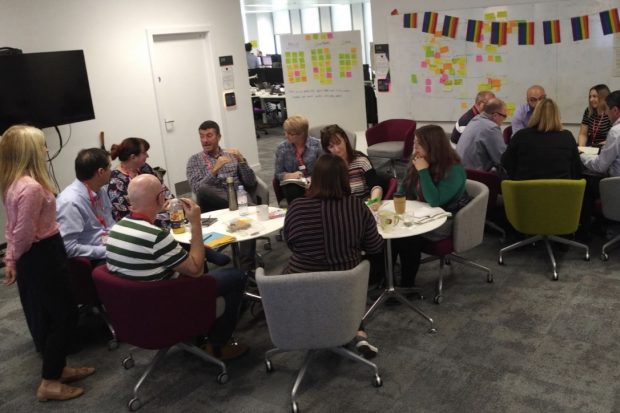
I love workshops – they’re great for user research in lots of ways. For co-designing or understanding problem statements, identifying user needs, process mapping and making collective and effective decisions.
If done right, they can yield exactly what you need really quickly.
How I’ve used workshops as a user researcher
From October 2018, DWP trialled a new service ‘Apply for a Direct Rent Payment’ in private beta. This is an online service that allows (under specific circumstances) landlords and letting agents to apply for the housing element of their tenant’s Universal Credit award to be paid directly to themselves and for the recovery of rent arrears.
In response to user feedback from landlords on the trial, the team developed, tested and iterated a number of notifications to advise landlords of the status of their application.
As a researcher trying to get the content of the notifications agreed, I realised that the priorities of the different stakeholder groups would make agreement challenging and extremely time consuming.
This is where the workshop is king in my view – if you do it right you can achieve what you need to in a relatively short time with the lion’s share of the work being done by the attendees on the day.
So here are my 10 top tips for running an effective workshop.
1. Have a clear objective and stick to it
The objective should define what you want to achieve. Make sure it is achievable in terms of the time you have. Make sure your objective has a ‘tangible’ output such as prototype or a decision. You want to come away with answers not questions.
Make it clear what the workshop is not – this helps to manage expectations and focus discussion when it steers off course.
2. Get the right people in the room
This can be hard if you don’t know who the right people are. Ask your team, ask your stakeholders and don’t be afraid to ask people you are not sure about – they can tell you if they don’t think they are appropriate.
Think about who you need in the room in terms of your objectives – do you need people that have decision making authority? Do you need people with particular skills or in a particular job role? Do you need both? Make sure you get the balance right.
3. Set the scene
Do this before and at the start of the workshop. Provide invitees with some background to and purpose of the workshop including what they will be required to do.
On the day take some time to run through the purpose of the workshop and provide context alongside the objectives. Be specific about any outputs you want and highlight the benefits of the workshop. This is important to get buy-in from attendees.
Stick your objectives and non-objectives on the wall in the room. Make it somewhere visible and keep referring back to them so that everyone has a reminder of why they are there.
4. Create the right environment
When people feel comfortable they are more likely to engage. Making people feel comfortable is especially important where there are stakeholders from different parts of the business and with different levels of seniority. You can do this by acknowledging the value that everyone has and explaining that they have been invited because of their particular knowledge or experience.
As facilitator it’s likely that your behaviour will set the standard for the day so keep it informal. If you are relaxed and comfortable then chances are the attendees will be too.
5. Design tasks and activities that have a clear and tangible output
Explain clearly what you want people to do and provide them with instructions they can refer to. Include your team in designing the activities. If you are running a co-design workshop, you’ll definitely want to make sure your interaction and content designer are included.
6. Facilitate the day and activities effectively
Consider chunking up the day between yourself and other team members so that you have a break. You may want certain colleagues to run sessions where they have more experience or knowledge than you.
Explain clearly what you want people to do during interactive sessions and make sure you are visible to ask questions or provide support if necessary.
Give regular time checks and keep people focused by steering the discussion back if it veers off-track.
Make sure you have enough facilitators to support activities that split the attendees in to multiple groups to complete tasks.
7. Don’t get bogged down in conversation you don’t have answers to
Instead, agree how you will answer those questions and move on. Similarly, if conversations aren’t adding any value, nip them in the bud. One way of doing this is to have an ideas board or 'car park' to record this type of thing.
8. Don’t make the day too long
Workshops can be draining. You’ll get the best out of people and yourself if you keep the workshop to less than 5 hours in total. Any longer than that and mental fatigue will set in. Have regular breaks as set out in the agenda and consider who else can run the workshop with you – you’ll be tired too!
9. Schedule time straight after the workshop
Get together with the team to analyse findings, gather insights and produce the intended outputs and artefacts. Do this as soon as possible while it is still fresh in your mind. Share these with the attendees if appropriate. Make sure you thank people for attending and respond to any action points you may have taken at the workshop.
10. Be collaborative
Last, but definitely not least, and possibly the most important – involve your team in the preparation, design, delivery and analysis of the workshop.
I'd love to hear any tips you have for running effective workshops - please comment below!
Like this blog? Why not subscribe for more blogs like this? Sign up for email updates whenever new content is posted!

4 comments
Comment by Izzy Johnson posted on
Great blog and something I'll be sharing more widely. Thank you!
Comment by Alan Helps posted on
Thanks for this summary. Most useful
Comment by Stacey Gee posted on
Great blog Jude!
Comment by Nick posted on
Very helpful